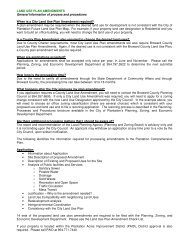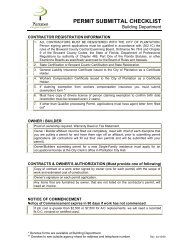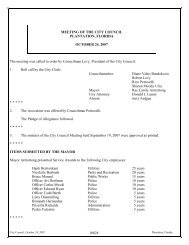COVERS Fall 2011_Layout 1 - City of Plantation
COVERS Fall 2011_Layout 1 - City of Plantation
COVERS Fall 2011_Layout 1 - City of Plantation
You also want an ePaper? Increase the reach of your titles
YUMPU automatically turns print PDFs into web optimized ePapers that Google loves.
Identity Theft HOW TO PROTECT YOUR GOOD NAME<br />
Identity theft is a serious crime. People<br />
whose identities have been stolen can spend<br />
months or years – and their hard earned<br />
money – cleaning up the mess the thieves have<br />
made in their good name and credit record.<br />
Some victims have lost job opportunities, been<br />
refused loans for education, housing or cars,<br />
or even been arrested for crimes they did not<br />
commit.<br />
CAN YOU PREVENT IDENTITY THEFT<br />
FROM OCCURRING?<br />
As with any crime, you cannot completely<br />
control whether or not you will become a<br />
victim. But, according to the Federal Trade<br />
Commission (FTC), you can minimize your risk<br />
by managing your personal information<br />
cautiously and with heightened sensitivity.<br />
HOW IDENTITY THEFT OCCURS<br />
Skilled thieves use a variety <strong>of</strong> methods to<br />
gain access to your personal information. They<br />
get information from businesses or other institutions<br />
by:<br />
u Stealing records from their employer.<br />
u Bribing an employee who has access to<br />
these records.<br />
u Hacking into the organizations computers.<br />
u They rummage through your trash, or the<br />
trash <strong>of</strong> businesses or dumps in a practice<br />
known as “dumpster diving.”<br />
u They obtain credit reports by abusing their<br />
employer’s authorized access to credit<br />
reports or by posing as a landlord,<br />
employer, or someone else who may have a<br />
legal right to the information.<br />
u They steal credit card information using a<br />
special storage device in a practice known<br />
as “skimming,” which processes debit card<br />
numbers the same as your card.<br />
u They steal wallets and purses containing<br />
identification and bank and credit cards.<br />
u They steal mail, including bank and credit<br />
card statements, pre-approved credit <strong>of</strong>fers,<br />
new checks or tax information.<br />
u The scam information from you by posing<br />
as a legitimate business person or<br />
government <strong>of</strong>ficial.<br />
ONCE IDENTITY THIEVES HAVE YOUR<br />
PERSONAL INFORMATION, THEY MAY:<br />
u Go on spending sprees using your credit<br />
and debit account numbers to buy “bigticket”<br />
items like computers that can easily<br />
sell.<br />
u Open a new credit card account, using your<br />
name, date <strong>of</strong> birth, and SSN. When they<br />
don’t pay the bills, the delinquent account<br />
is reported on your credit report.<br />
u Change the mailing address on your credit<br />
card account. The imposter then runs up a<br />
charge on the account. Because the bills<br />
are being sent to the new address, it may<br />
take some time before you realize there is a<br />
problem.<br />
u Take out auto loans in your name.<br />
u Establish phone or wireless service in your<br />
name.<br />
u Counterfeit checks or debit cards and drain<br />
your bank account.<br />
u Open a bank account in your name and<br />
write bad checks on that account.<br />
u File for bankruptcy under your name to<br />
avoid paying debts they’ve incurred or<br />
avoids eviction.<br />
u Give your name to the police during an<br />
arrest. If they are released and don’t show<br />
up for their court date, an arrest warrant<br />
could be issued in your name.<br />
HOW CAN I TELL IF I’M A VICTIM<br />
OF IDENTITY THEFT?<br />
Monitor the balances <strong>of</strong> your financial<br />
accounts. Look for unexplained charges or<br />
withdrawals. Other indications <strong>of</strong> identity theft<br />
could be:<br />
u Failing to receive bills or other mail<br />
signaling an address change by the identity<br />
thief.<br />
u Receiving credit cards for which you did not<br />
apply.<br />
u Denial <strong>of</strong> credit for no apparent reason.<br />
u Receiving calls from debt collectors or<br />
companies about merchandise or services<br />
you didn’t buy.<br />
ARE THERE OTHER STEPS I CAN TAKE?<br />
If an identity thief is opening new credit<br />
accounts in your name, these accounts are<br />
likely to show up on your credit report. You<br />
can find out by ordering a copy <strong>of</strong> your credit<br />
report from any <strong>of</strong> the three major credit<br />
bureaus. (TransUnion, Experian, Equifax.) If<br />
you find inaccurate information, check your<br />
reports from the other two credit bureaus. Of<br />
course, some in accuracies on your credit<br />
report may be because <strong>of</strong> computer, clerical,<br />
or other errors and may not at all be the result<br />
<strong>of</strong> identity theft. Note: If your personal information<br />
has been lost or stolen, you may want<br />
to check all <strong>of</strong> your reports more frequently<br />
for the first year. Federal law allows credit<br />
bureaus to charge you up to $9 for a copy <strong>of</strong><br />
your credit report. Some states may allow a<br />
free report or reduced rates.<br />
MANAGING YOUR<br />
PERSONAL INFORMATION<br />
So, how can a responsible consumer<br />
minimize the risk <strong>of</strong> identity theft, as well as<br />
the potential for damage? When it involves your<br />
personal information, exercise caution and<br />
prudence.<br />
DO IT NOW<br />
u Place passwords on your credit card, bank<br />
and phone accounts. Avoid using easily<br />
available information like you mother’s<br />
maiden name, your date <strong>of</strong> birth, the last<br />
four numbers <strong>of</strong> your SSN, or a series <strong>of</strong><br />
consecutive numbers. When you’re asked<br />
for your mothers maiden name on an<br />
application on a anew account, try using a<br />
password instead.<br />
u Secure personal information on in your<br />
home, especially if you have roommates,<br />
employ outside help, or are having service<br />
work done in your home.<br />
u Ask about information security procedures<br />
in your workplace. Find out who has access<br />
to your personal information and verify that<br />
your records are kept in a secure location.<br />
Ask about the disposal procedures for<br />
those records as well.<br />
EVERYDAY DILIGENCE<br />
u Don’t give out personal information on the<br />
phone, through the mail, or over the<br />
Internet unless you’ve initiated the contact<br />
or are sure you know whom you’re dealing<br />
with. Identity thieves can be skilled liars,<br />
and may pose as representatives from<br />
banks, Internet service Providers (ISPs), or<br />
even government agencies to get you to<br />
reveal identifying information. Before you<br />
divulge any information, confirm that<br />
you’re dealing with a legitimate representative<br />
<strong>of</strong> a legitimate organization. Always<br />
double check by calling customer service<br />
using the account number on your account<br />
statement or the number in the telephone<br />
book, they may be using a fictitious<br />
number.<br />
u Guard your mail and trash from theft.<br />
Identy Theft (Continued)<br />
10 <strong>Plantation</strong> Quarterly <strong>Fall</strong> <strong>2011</strong>
















